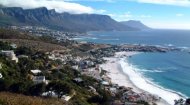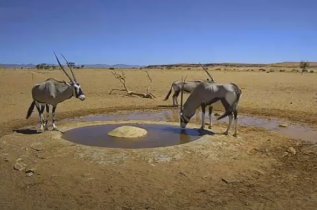|
Karoo Desert |
Karoo Desert |
Karoo Desert | Karoo Desert |
Karoo Desert FactsIconic Karoo plants include the various "bushman's candles" (Sarcocaulon species), which exude a flammable resin, and countless species of Mesembryanthemaceae (vygies), which carpet the ground with vibrant blooms after sparse rainfall. The hardy "gannabos" and various acacia species provide crucial forage for wildlife and livestock. The sight of the Karoo transforming from a seemingly barren landscape into a carpet of delicate wildflowers after a rare downpour is a truly magical experience. The animal kingdom of the Karoo is equally resilient and fascinating, with species that have developed specific behaviors and physiological adaptations to survive the arid environment. Mammals like the aardvark, the elusive caracal, and various species of antelope such as springbok, gemsbok, and kudu roam the vast plains alongside black rhino, the mountain zebra and Cape and bat-eared foxes. Smaller mammals include meerkats, ground squirrels, and a variety of rodents. Birdlife is also surprisingly diverse, with species ranging from large raptors like the Martial Eagle to ground-dwelling birds such as the Southern Pale Chanting Goshawk and various lark species. Reptiles, including numerous snake and lizard species, thrive in the hot, dry conditions, often being most active during the cooler parts of the day or night. The Karoo also harbors unique invertebrates, many of which play vital roles in the ecosystem. The Karoo's human history stretches back millennia, with evidence of early Stone Age cultures and the San people, who left behind a legacy of remarkable rock art. European settlers arrived in the 18th century, drawn by the vast grazing lands, and established scattered farms. The region became synonymous with sheep farming, particularly merino and dorper breeds, and the production of wool and mohair. The Little Karoo also became the world's primary source of ostrich feathers in the late 19th and early 20th centuries, leading to an "ostrich feather boom" that fundamentally shaped towns like Oudtshoorn. The Karoo is also a paleontological treasure trove, holding some of the most significant fossil records of pre-dinosaur life on Earth. Its sedimentary rocks preserve a continuous record of ancient life from the Permian and Triassic periods, offering invaluable insights into the evolution of vertebrates, including the ancestors of mammals. Quaint Karoo towns, with their unique architecture featuring wide verandas and corrugated iron roofs, dot the landscape, each with its own stories of hardy pioneers, remote living, and a slower pace of life. Today, despite the Karoo's arid nature, there are a number of small communities living inside the desert. The oldest and largest such town, Beaufort West, can be traced back to the 1830s and is located close to the Karoo Nature Reserve. One of its claims to fame is that Beaufort West was the birthplace of Doctor Christian Barnard who performed the world's first successful heart transplant operation. Most of these towns supply the vast tracks of land that are used to rear marino sheep and cattle. Historically, the Karoo's economy has been dominated by extensive livestock farming. However, in recent decades, diversification has become increasingly important. Tourism is growing, with visitors drawn to the region's unique landscapes, clear night skies (ideal for stargazing), hiking trails, and historical sites. The Karoo is also at the forefront of renewable energy development in South Africa, with significant investments in solar and wind farms capitalizing on the abundant sunshine and expansive, unpopulated areas. The proposed Square Kilometre Array (SKA) radio telescope, located in the Northern Cape Karoo due to its radio-quiet environment, further solidifies the region's role in global scientific endeavors. The Karoo's unique biodiversity, particularly its succulent flora, makes it an area of significant ecological importance. However, it faces various challenges, including climate change, overgrazing in some areas, and the impacts of infrastructure development. Conservation efforts focus on sustainable land management practices, protecting crucial habitats, and raising awareness about the Karoo's fragile ecosystems. The protection of its endemic species and ancient landscapes is vital, not just for South Africa, but for global biodiversity. |








